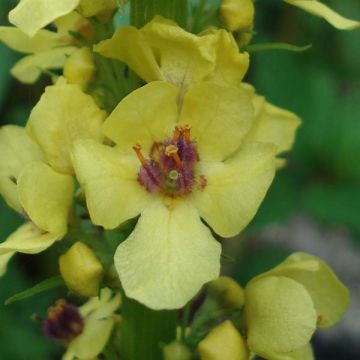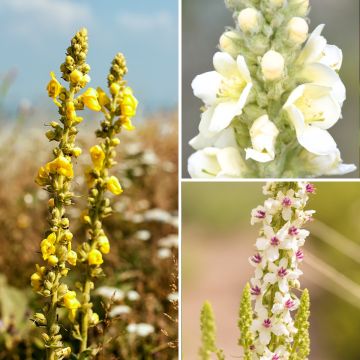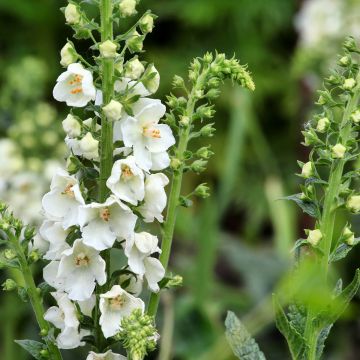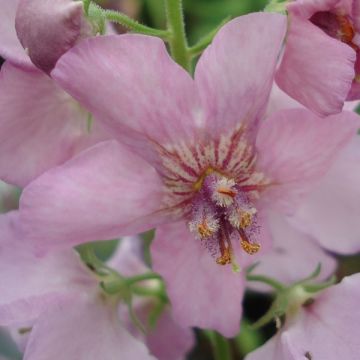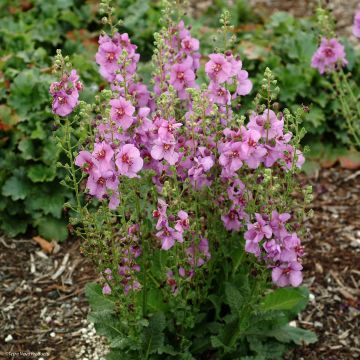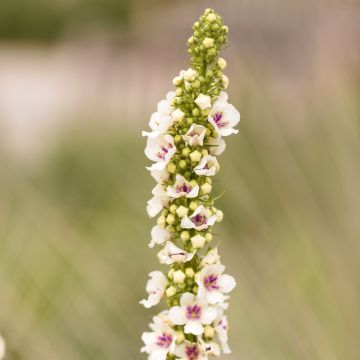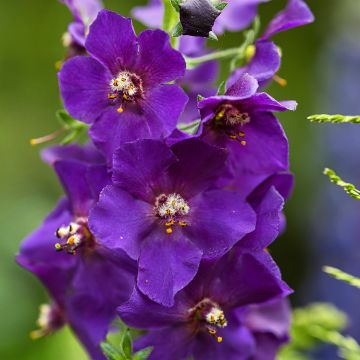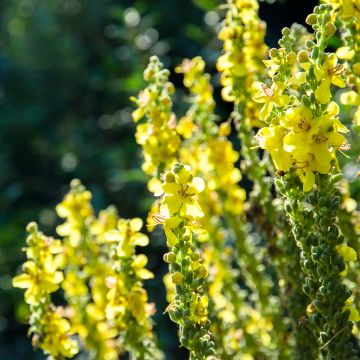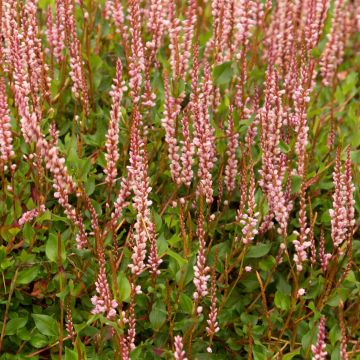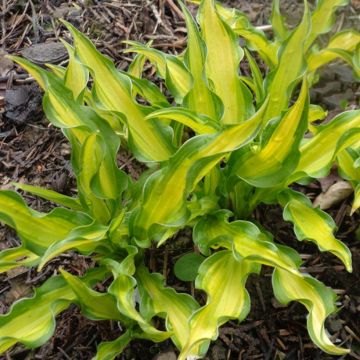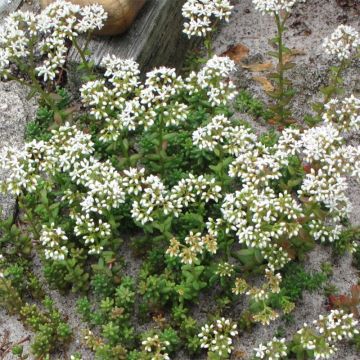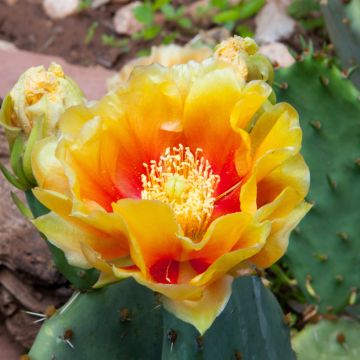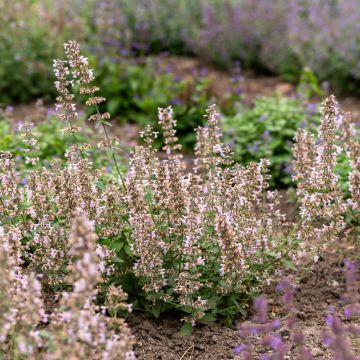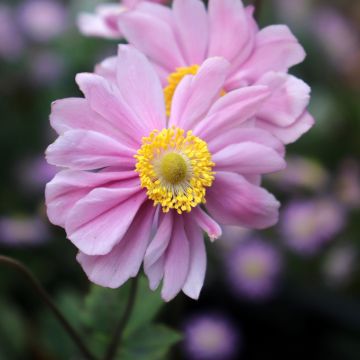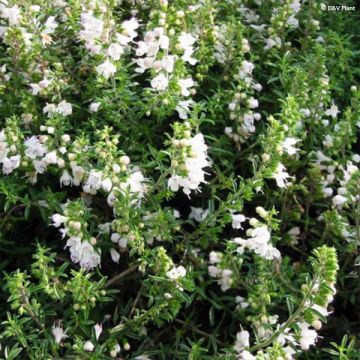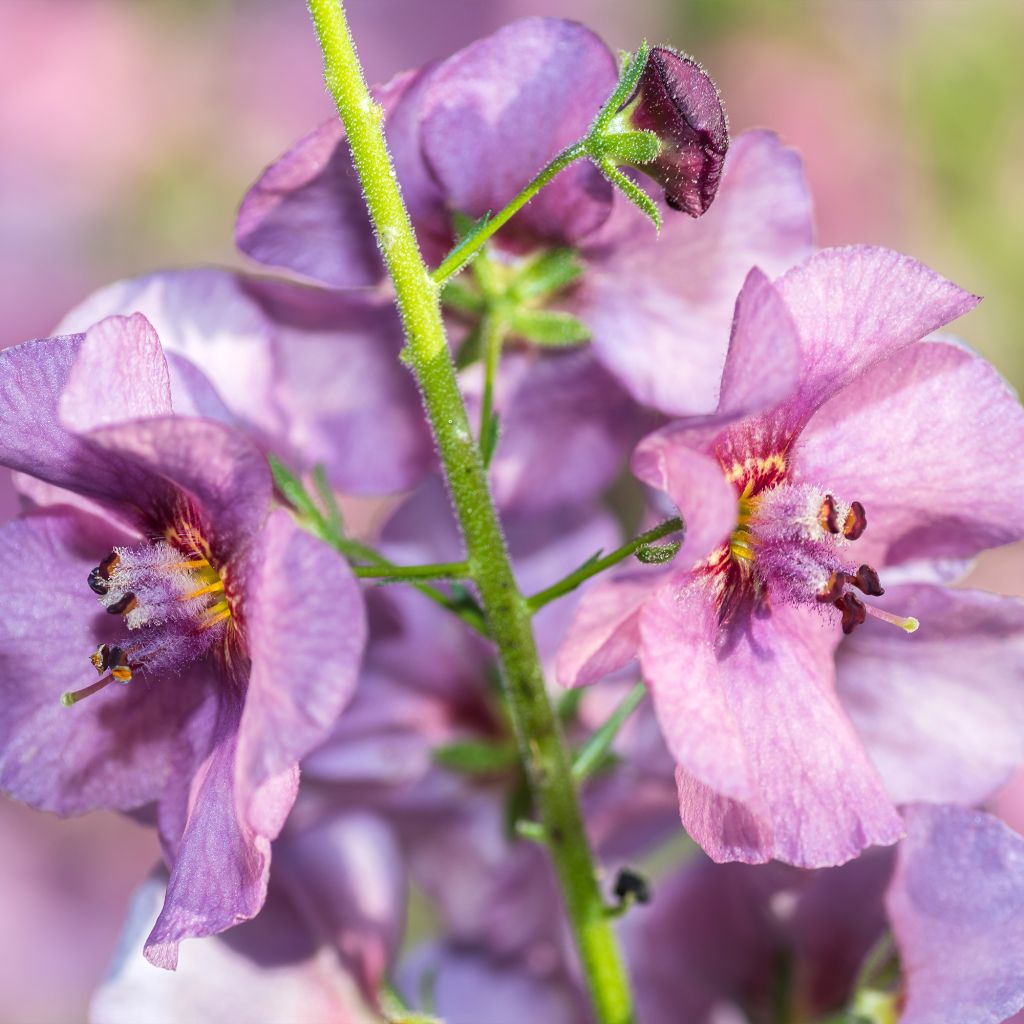

Verbascum Pink Domino - Mullein
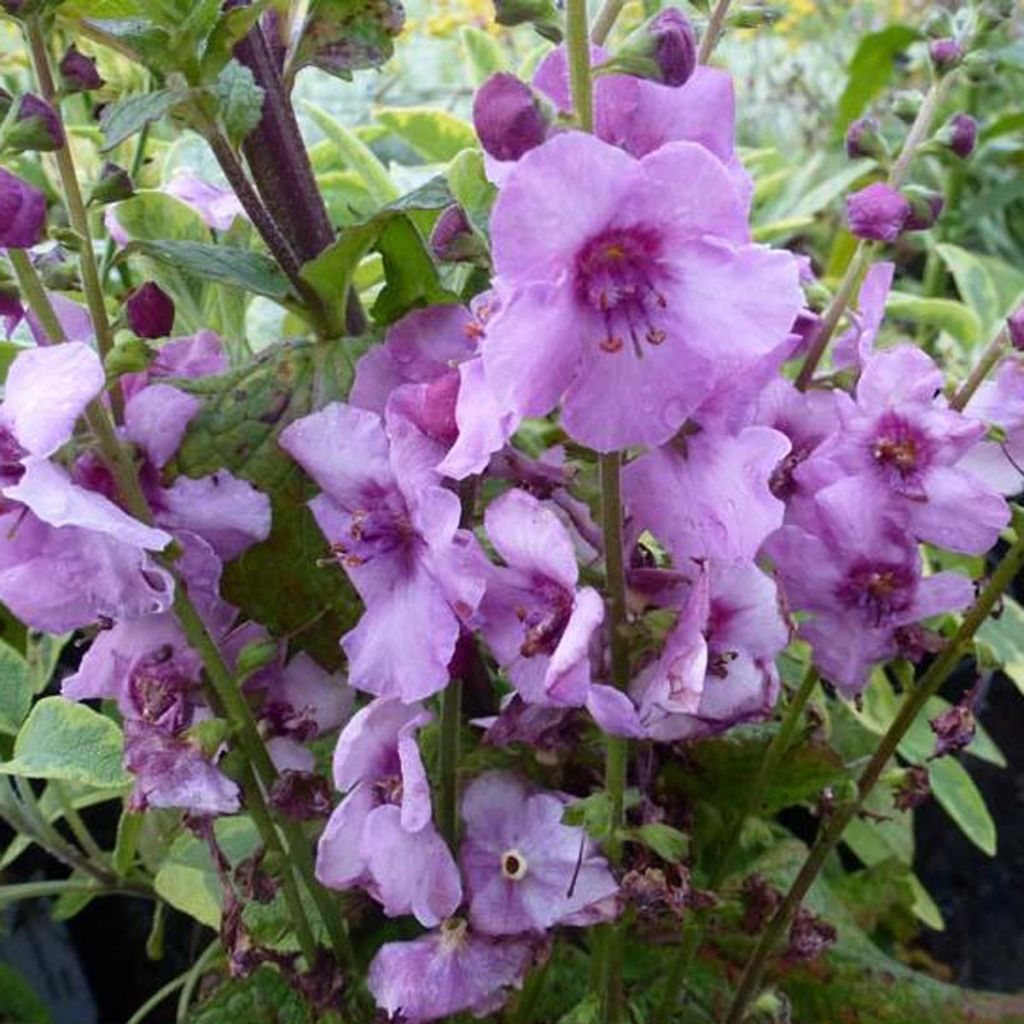

Verbascum Pink Domino - Mullein
Verbascum Pink Domino - Mullein
Verbascum Pink Domino
Mullein
This item cannot be shipped to the selected country
Delivery charge from €5.90
More information
Schedule delivery date,
and select date in basket
This plant carries a 12 months recovery warranty
More information
We guarantee the quality of our plants for a full growing cycle, and will replace at our expense any plant that fails to recover under normal climatic and planting conditions.
From €5.90 for pickup delivery and €6.90 for home delivery
Express home delivery from €8.90.


Does this plant fit my garden?
Set up your Plantfit profile →
Description
Verbascum 'Pink Domino', also known as Hybrid Mullein or White Mullein, is a graceful herbaceous perennial. It produces beautiful, abundantly blooming spikes of fresh pink flowers with a darker heart in summer from opulent, semi-evergreen, dark green basal rosettes. This incredibly generous, fresh and light, giant plant grows quickly and upright. It is indispensable in romantic and slightly wild flowerbeds, and poor soil.
The 'Pink Domino' Hybrid Mullein belongs to the Scrophulariaceae family. It is a hybrid, resulting from the cross-breeding between Verbascum phoeniceum, native to central-eastern Europe and the Middle East, and Verbascum olympicum, a giant plant native to Greece. This plant can reach a height of 1m (3ft). Its growth is rapid, reaching its final size in one month. This perennial has a rosette from which long branched floral stems emerge. It flowers from June to August, with pyramidal spikes reaching 70 cm (28in) high, composed of cup-shaped flowers measuring 3 cm (1in) in diameter. The flowers are fresh pink with a carmine throat, densely packed and opening here and there along the spike. The rosettes consist of ovate to elliptical, wavy, dark grey-green leaves, 20 cm (8in) long. This mullein is nectar-rich and loved by bees. Although theoretically perennial, it is often grown as a biennial as it is not very long-lived but it easily self-seeds in light soil.
The 'Pink Domino' Verbascum should be planted in full sun. This mullein should be planted in spring, in ordinary, light, porous, well-drained soil, and prefers moist to dry alkaline soil where it will readily self-seed (the flower colour will not come true to the parent). Remove faded flowers at the base to encourage more flowers and longevity of the plant. Cut back dry parts as soon as they are no longer decorative and clean the clump in late winter at the latest.
As a plant for open and dry spaces, 'Pink Domino' Hybrid Verbascum is a blessing for 'impossible' slopes, where it will look good alongside valerians and stonecrops. Natural scenes in slightly wild areas of the garden will be transformed by hybrid mulleins. Pair them with hollyhocks, Amorpha canescens, dittany, blue lavenders, wild chicory, perennial flax, or the wonderful purple fennel. It can also be a very beautiful container plant if watered and fed regularly.
Report an error about the product description
Verbascum Pink Domino - Mullein in pictures
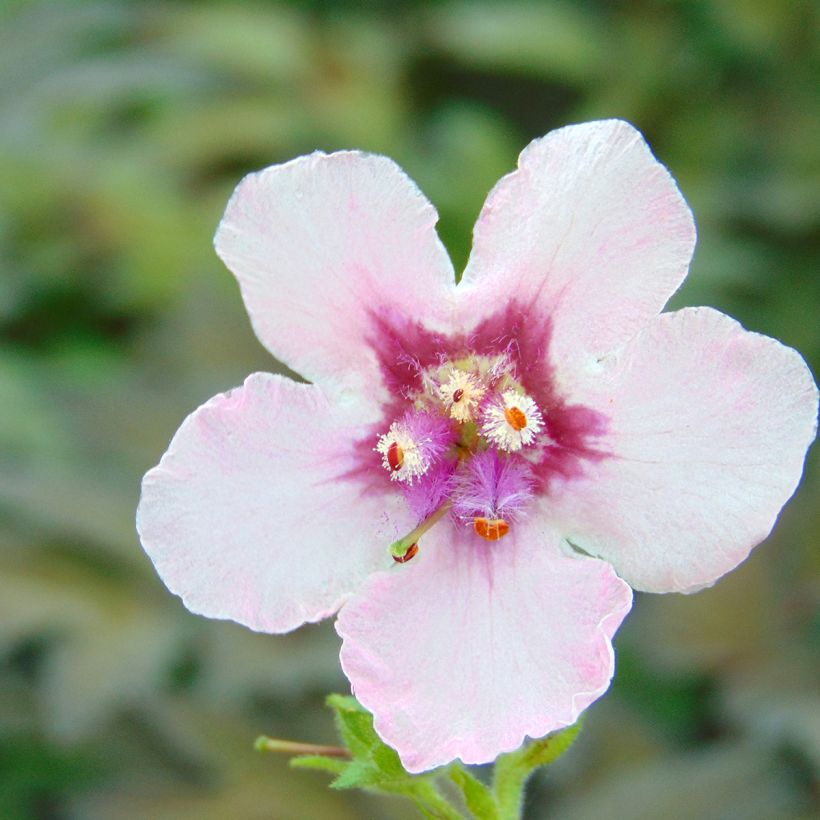



Flowering
Foliage
Plant habit
Botanical data
Verbascum
Pink Domino
Scrophulariaceae
Mullein
Cultivar or hybrid
Other Verbascum - Mullein
Planting and care
Verbascum 'Pink Domino' must be installed in full sun. This mullein should be planted in spring, in ordinary, light and porous, well-drained soil, and prefers moist to dry limestone soil where it will readily self-seed (the colour of the flowers may not come true to the parent). It does not tolerate soil which are waterlogged in winter, which will be fatal. Cut the faded inflorescences at the base of the stem to promote more flowers and longevity of the plant. Cut back the dry parts as soon as they are no longer decorative and clean up the clump no later than the end of winter.
Planting period
Intended location
Care
-
, onOrder confirmed
Reply from on Promesse de fleurs
Summer flowering perennials
Haven't found what you were looking for?
Hardiness is the lowest winter temperature a plant can endure without suffering serious damage or even dying. However, hardiness is affected by location (a sheltered area, such as a patio), protection (winter cover) and soil type (hardiness is improved by well-drained soil).

Photo Sharing Terms & Conditions
In order to encourage gardeners to interact and share their experiences, Promesse de fleurs offers various media enabling content to be uploaded onto its Site - in particular via the ‘Photo sharing’ module.
The User agrees to refrain from:
- Posting any content that is illegal, prejudicial, insulting, racist, inciteful to hatred, revisionist, contrary to public decency, that infringes on privacy or on the privacy rights of third parties, in particular the publicity rights of persons and goods, intellectual property rights, or the right to privacy.
- Submitting content on behalf of a third party;
- Impersonate the identity of a third party and/or publish any personal information about a third party;
In general, the User undertakes to refrain from any unethical behaviour.
All Content (in particular text, comments, files, images, photos, videos, creative works, etc.), which may be subject to property or intellectual property rights, image or other private rights, shall remain the property of the User, subject to the limited rights granted by the terms of the licence granted by Promesse de fleurs as stated below. Users are at liberty to publish or not to publish such Content on the Site, notably via the ‘Photo Sharing’ facility, and accept that this Content shall be made public and freely accessible, notably on the Internet.
Users further acknowledge, undertake to have ,and guarantee that they hold all necessary rights and permissions to publish such material on the Site, in particular with regard to the legislation in force pertaining to any privacy, property, intellectual property, image, or contractual rights, or rights of any other nature. By publishing such Content on the Site, Users acknowledge accepting full liability as publishers of the Content within the meaning of the law, and grant Promesse de fleurs, free of charge, an inclusive, worldwide licence for the said Content for the entire duration of its publication, including all reproduction, representation, up/downloading, displaying, performing, transmission, and storage rights.
Users also grant permission for their name to be linked to the Content and accept that this link may not always be made available.
By engaging in posting material, Users consent to their Content becoming automatically accessible on the Internet, in particular on other sites and/or blogs and/or web pages of the Promesse de fleurs site, including in particular social pages and the Promesse de fleurs catalogue.
Users may secure the removal of entrusted content free of charge by issuing a simple request via our contact form.
The flowering period indicated on our website applies to countries and regions located in USDA zone 8 (France, the United Kingdom, Ireland, the Netherlands, etc.)
It will vary according to where you live:
- In zones 9 to 10 (Italy, Spain, Greece, etc.), flowering will occur about 2 to 4 weeks earlier.
- In zones 6 to 7 (Germany, Poland, Slovenia, and lower mountainous regions), flowering will be delayed by 2 to 3 weeks.
- In zone 5 (Central Europe, Scandinavia), blooming will be delayed by 3 to 5 weeks.
In temperate climates, pruning of spring-flowering shrubs (forsythia, spireas, etc.) should be done just after flowering.
Pruning of summer-flowering shrubs (Indian Lilac, Perovskia, etc.) can be done in winter or spring.
In cold regions as well as with frost-sensitive plants, avoid pruning too early when severe frosts may still occur.
The planting period indicated on our website applies to countries and regions located in USDA zone 8 (France, United Kingdom, Ireland, Netherlands).
It will vary according to where you live:
- In Mediterranean zones (Marseille, Madrid, Milan, etc.), autumn and winter are the best planting periods.
- In continental zones (Strasbourg, Munich, Vienna, etc.), delay planting by 2 to 3 weeks in spring and bring it forward by 2 to 4 weeks in autumn.
- In mountainous regions (the Alps, Pyrenees, Carpathians, etc.), it is best to plant in late spring (May-June) or late summer (August-September).
The harvesting period indicated on our website applies to countries and regions in USDA zone 8 (France, England, Ireland, the Netherlands).
In colder areas (Scandinavia, Poland, Austria...) fruit and vegetable harvests are likely to be delayed by 3-4 weeks.
In warmer areas (Italy, Spain, Greece, etc.), harvesting will probably take place earlier, depending on weather conditions.
The sowing periods indicated on our website apply to countries and regions within USDA Zone 8 (France, UK, Ireland, Netherlands).
In colder areas (Scandinavia, Poland, Austria...), delay any outdoor sowing by 3-4 weeks, or sow under glass.
In warmer climes (Italy, Spain, Greece, etc.), bring outdoor sowing forward by a few weeks.

































